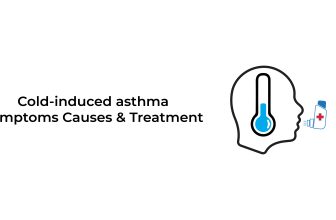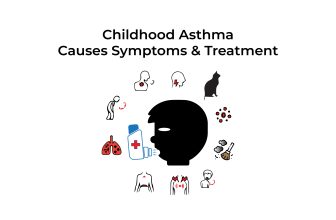Asthma
The medical condition of having breathing problems is called asthma. Usually, people with asthma don’t have breathing issues all the time. They face difficulty in breathing during an episode of asthma. Asthma attacks can be due to different triggers. Usually, people suffer from asthma symptoms in their childhood. But adults also have asthma.
Asthma has no treatment, but remedies are used to reverse symptoms. We will discuss in this article the causes, symptoms, and treatment of asthma.
Due to some unknown reasons, a person’s airways get clogged. As a result of this clogging, they produce more mucus which results in breathing problems. Some people get a very severe asthma attack and get it more frequently, so they need treatment to control their asthma to perform daily activities.
Symptoms of Asthma
Symptoms of Asthma differ from one individual to another. Asthma attacks are triggered usually during exercising or in a dusty atmosphere. The symptoms of asthma are listed below.
- Difficulty in breathing
- Pain or discomfort in the chest
- Exhaling wheezing is a common asthmatic symptom in youngsters.
- Shortness of breath, coughing, or wheezing may make sleeping difficult.
- Coughing or wheezing attacks exacerbated by a respiratory virus, such as the flu or a cold
Asthma symptoms are more frequent and bothersome, so a person needs to take some measures like keeping a device with themselves to check the lungs’ work. Difficulty breathing can cause many other problems like Insomnia, where a person can’t sleep due to constant issues in breathing. If you’re an asthma patient, keep your inhaler with you. Environmental factors like smell, dust particles, and allergens can trigger asthma. Also, exercising can induce asthma symptoms because, during a workout, it’s natural to have heavy breathing, which can lead you to further breathing problems.
Causes and triggers of Asthma
Due to genetics and environmental factors, some people are more susceptible to asthma than others.
Asthma, like other allergies, can be triggered by various allergens. Triggers differ from one person to another.
For Asthmatics, pollens, dust, germs, and mold spores can all be allergens. Respiratory diseases like common cold and flu, excessive physical activity such as running in cold weather, tobacco, and air pollutants such as dust particles also causes asthma.
Delicacies with additional preservatives, cold beverages, and sea foods like shrimp, dried fruits, processed potatoes, and alcohol are potential asthma triggers. It would help if you avoided the medicines as they can trigger asthma, for example, Non-steroidal anti-inflammatory drugs (NSAIDs) and beta blockers. Emotions and stress can also induce asthma. Thus, the patient should avoid them as much as possible, and the surrounding environment should be calm.
Treatment
Because there is no other way to regulate symptoms, the traditional asthma treatment is medication. Because asthma is an inflammatory disorder that clogs and narrows the airways, medications usually include anti-inflammatories. Such medicines relax muscles and open the airways by lowering mucus formation and reducing inflammation. Bronchodilators and other similar drugs are used for the same purpose. Asthma symptoms can also be treated with medicines. However, an inhaler is required for immediate relief. You can take asthma medications in a variety of ways. You can use a metered-dose inhaler, nebulizer, or another type of asthma inhaler for breathing in the meds. Your healthcare provider may prescribe oral medications for you to take.
Preventive measures
You can’t avoid asthma, but you can take steps to reduce the frequency of attacks and control symptoms. Also, because this is a condition that one cannot be fully treated, it is highly advised that you maintain contact with your doctor and learn to live with your symptoms. The only thing you can do is try to alleviate the discomfort as much as possible. There are a few preventive steps that every asthma patient should think about:
Be aware of your condition
Learn your health and be conscious of your medical situation as much as possible. Consult your doctor and devise a strategy to keep your asthma under control. Keep an eye on what triggers your asthma and try to avoid those things because everyone’s asthma is different, so learn about your asthma triggers. Make sure to take medicines regularly.
Get all essential vaccinations
Other medical illnesses such as pneumonia or Corona contribute to causing asthma. To avoid asthma episodes produced by specific disorders, visit your doctor and be vaccinated against them. People in Corona have respiratory problems, which might exacerbate asthma symptoms.
Don’t only rely on your doctor; take charge of your health. Please track how often you have asthma attacks and what variables may contribute to them. Talk to your doctor about what you’ve noticed and experienced. They will be better able to comprehend your problem and provide therapy recommendations accordingly. Keep an eye on your peak flow, which you can do with a gadget that records your lungs’ peak airflow. It is something that you can readily check at home.
Early detection and treatment of attacks are essential
You’re less likely to suffer a severe attack if you act instantly. You’ll also keep your symptoms under control with fewer medicines.
Take your medication as directed when the peak flow measures drop, signaling an impending attack. Stop any action that may have caused the attack as well. If your symptoms do not improve, follow the instructions in your action plan to seek medical treatment.
Take your medication seriously
Even if you haven’t had an asthma attack in a while, see your doctor before changing your meds. Try to bring your medicines to each doctor’s appointment. Also, don’t discontinue taking medications without first consulting your doctor. Your doctor can check to see if you’re taking your medications correctly and at the recommended dose.
Don’t keep yourself relying on inhalers
It would help if you concentrated on increasing your use of quick-relief inhalers because you may depend too much on them. If you rely on a quick-relief inhaler like albuterol, your asthma isn’t under control. If you need to change your treatment plan, talk to your doctor. And instead of using an inhaler every time you have a slight breathing problem, try to endure.
References:
- https://www.nhs.uk/conditions/asthma/treatment/
- https://www.mayoclinic.org/diseases-conditions/asthma/symptoms-causes/syc-20369653
- https://my.clevelandclinic.org/health/diseases/6424-asthma





